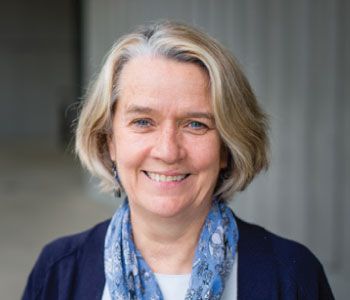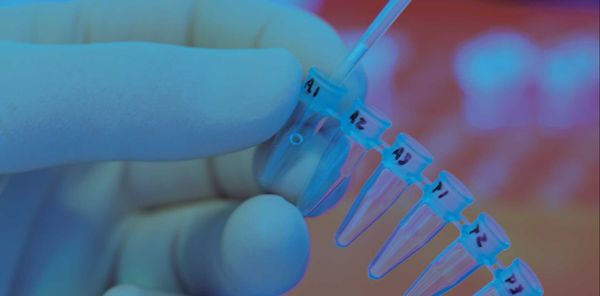Rapid whole genome sequencing is a state-of-the-art test that can quickly identify genetic disorders in a fetus or baby with unexplained health complications. It's the most comprehensive genetic test available.
While other genetic tests look at a small number of genes to check for a few specific conditions, whole genome sequencing analyzes the patient's entire genome (all the genes and the DNA between genes). By casting the widest net possible, we can quickly detect a large array of genetic issues, including rare conditions that might otherwise go undiagnosed. Finding the underlying cause allows doctors to determine the best care for your baby from the start.
Pregnant patients can access fetal testing at our Fetal Treatment Center, and newborn testing is available to babies in our neonatal intensive care units (NICUs).
Rapid whole genome sequencing is performed and analyzed here at UCSF, and results are available quickly – usually within two to four weeks. Getting results fast can be particularly important for conditions that need prompt treatment. For example, early intervention can dramatically change the course of inherited metabolic disorders, such as lysosomal storage diseases.
We are now able to offer whole genome sequencing to all eligible patients as part of our comprehensive care. Most cases of fetal physical anomalies are eligible.
Benefits of whole genome sequencing
- Tens of thousands of genes are analyzed at once, so we can quickly detect almost any genetic issue.
- Results can be used to determine the best course of care during pregnancy, at delivery and after birth.
- If you plan to have more children, the results can help us estimate the chances of the same condition occurring again and enable more accurate prenatal diagnoses in future pregnancies.
What is exome sequencing?
More efficient than tests that look at single genes one at a time, exome sequencing is a genomic technique for analyzing all the protein-coding regions of the genome. These regions are referred to as the exome. Focusing on this small portion (only 2 percent) is less expensive than sequencing the whole genome but still identifies a genetic diagnosis in many cases.
The goal of exome sequencing is to cast a wider net than is possible with specific gene panels, to more quickly identify genetic etiologies of diseases. Researchers at UCSF Benioff Children’s Hospitals are using exome sequencing to better understand the causes of fetal anomalies. The result may improve patient care.
Webinar: When Is Exome Sequencing Valuable in Prenatal Diagnosis?
View the webinar, with maternal-fetal medicine specialist, Mary E. Norton, MD, discussing genetic testing options, with a focus on when exome sequencing has value to families. Also, perinatologist, Teresa N. Sparks, MD, presents specifics on exome sequencing for nonimmune hydrops fetalis, caused by many single-gene disorders, plus a look at findings from her current NIHF study.
Prenatal exome sequencing at UCSF
Our center offers comprehensive genetic testing to patients when a prenatal ultrasound has shown fetal structural anomalies – visible physical differences – that could be due to a genetic disorder. Before scheduling any test, our genetic counselors review the options with each patient. Commonly available tests include cell-free DNA screening and chromosomal microarray analysis. Recently, specialists have found that when these tests don’t provide a diagnosis, exome sequencing often can. Exome sequencing is one of the most comprehensive genetic tests currently available, and we are pleased to offer this option to eligible women through our Fetal Treatment Center.
Exome sequencing is done at our UCSF laboratory, which allows interpretation of results by our multidisciplinary team and facilitates consultation with patients so that they can learn the meaning of any findings. When a patient’s test results are available, she meets with one of our genetic counselors and board-certified perinatal geneticists to go over the results and any implications for decisions on care.
Through the UCSF laboratory, our geneticists and genomic medicine specialists have provided and interpreted exome sequencing for hundreds of pregnant patients with fetal structural anomalies. We have found this comprehensive analysis of thousands of genes to be helpful to both our patients and our subspecialists in determining the best course of care in complex pregnancies. In about one in five cases, we find a gene variant – a genetic difference – that explains the ultrasound findings and helps us provide better counseling on managing the pregnancy, the delivery and the newborn’s care. The test results can also help us assess the likelihood that the same condition will affect future pregnancies.
Fetal Exome Geneticists

Billie Lianoglou, MS, LCGC
Genetic Counselor
Billie.Lianoglou@ucsf.edu
415-476-2461

Mary E. Norton, MD
Perinatologist and Clinical Geneticist
Co-Director, Center for Maternal-Fetal Precision Medicine
Director, Division of Maternal-Fetal Medicine
Mary.Norton@ucsf.edu
415-353-7865

Teresa Sparks, MD, MAS
Perinatologist and Clinical Geneticist
Teresa.Sparks@ucsf.edu
415-476-3156
